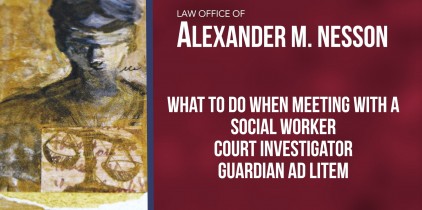DCF wants me to sign releases, what should I do?
Every case is unique, but it is the best practice to go over the Releases with an attorney first. Not saying that you are denying signing the Releases or agreeing to sign the Releases, just say that you want to review it with an attorney; or particularly with your attorney. When I work with families I ask to review every document that my client is being asked to sign. Sometimes it is best to not sign the documents; other times it is best to do something called the “Limited Release” limiting what DCF can look at and the dates. Even if there is something that you don’t think is harmful to you, sometimes you do not know what healthcare professionals, daycare records or counseling records can have in them. Sometimes there can be information that can be hurtful to your family or that can be misinterpreted. Other times it is appropriate to sign all Releases. Generally, I would recommend at least doing Limited Releases, but do not try and just make a snap decision.
How to Hire an Attorney that Defends DCF Cases or Child Welfare Cases?
You want to be careful in terms of who you are looking to hire. It is an expensive and important process and you want to be able to find an attorney that you are comfortable with and there is not a right fit for every attorney and a client. You want to find an attorney that has significant practice with DCF cases; particularly, that have had a lot of hearings whether those are trials, 72-hour hearings, Fair Hearing Appeals and looking at their experience with DCF cases. It is important not to hire a general practice attorney because there are some complexities and some unique aspects of DCF cases and it is important to talk to the attorney about their experience working with DCF. In particularly, their willingness to go to trial or contest cases in certain circumstances.
Getting a referral from another attorney who they know have handled DCF cases; looking to make sure that your attorney does not have any misconduct issues; talking to the attorney their familiarity with a court; which has advantages and disadvantages; talking to the attorney about their particular trial schedule and asking the questions that you need to answer. I might be a good attorney for one client because of what they are looking for, but not a good attorney for another client, depending on what they are looking for. Even if you find someone that has a good experience and good reviews from other people, does not necessarily mean that is going to be who you want to hire. You want to sit down with the attorney and have an open mind and ask the questions that you need answers to. Also, be very careful if an attorney gives you a guarantee about what will happen or not happen in terms of the results, as cases are very complicated and they’re not cookie cutter where you know the answer to what is going to happen in litigation.
In Massachusetts in DCF Cases, it is very important for Parents to know their Rights.
The reason for this, is a lot of times people are questioned by somebody in authority and you think you must answer everything that they say. Knowing your rights will help understand what you need to, what is something that you can answer and what you should not answer. Whether you are talking to an attorney about your rights and having an attorney handle it; or doing some research on your own. You do not want to fight just to fight with DCF, but you also do not want to be steamrolled by the process. You want to avoid being angry and screaming because of the frustration that you might have with DCF but be able to understand what rights you have; which can include the right to refuse having DCF come into your home. Again, just because you have the rights whether you want exercise that is something that would be beneficial to discuss with an attorney.







